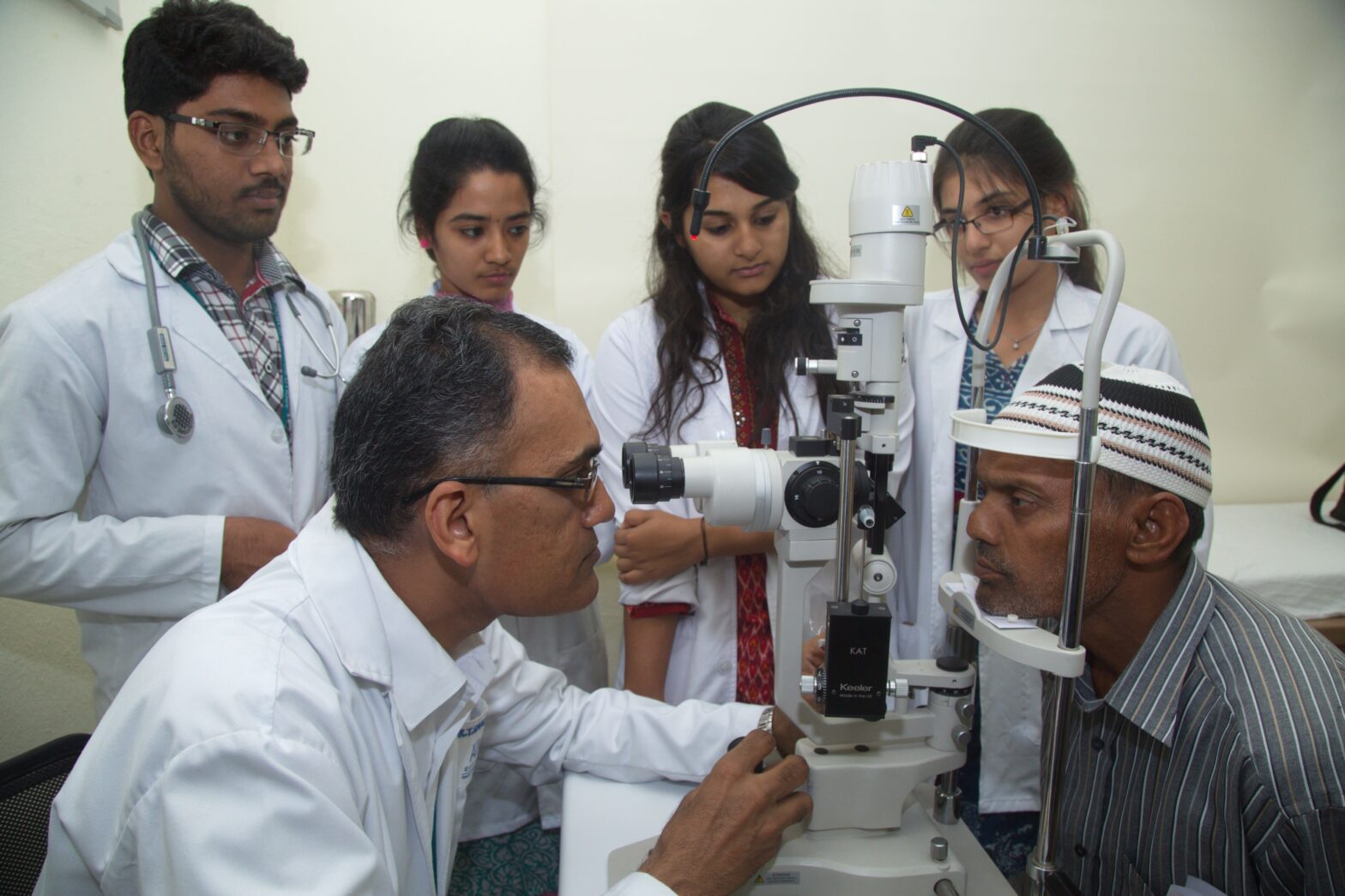
The Department of Ophthalmology in AIMSR general Hospital is equipped with state-of-the-art infrastructure to keep up with the advancement in technology in the evaluation and management of eye problem and blindness. The Department has faculty who are well experienced and are excellent in their professional competence.
Outpatient services include refraction and prescription of spectacles, slit lamp bio microscopic evaluation of the anterior and posterior segment and applanation tonometry. Routine screening is undertaken for Glaucoma, Diabetic and Hypertensive retinopathy and Retinopathy of Prematurity in
premature infants. There is a modern theatre where cataract surgeries with foldable intra ocular lens implantation are regularly undertaken.
Our faculty have experience in a broad range of subspecialties such as the cornea, retina, uvea, glaucoma, squint, neuro-ophthalmology, paediatric ophthalmology, orbit, and oculoplasty. The Department is recognized for its work in patient care, education, and research.
OPD Timing
+Cornea clinic : Monday (9 am to 4 pm)
Glaucoma clinic : Tuesday (9am to 4 pm)
Retina clinic : Wednesday (9am to 4pm)
Pediatric squint clinic : Thursday (9am to 4 pm)
Oculoplasty clinic : Friday (9am to 4 pm)
Surgery Provided
+Orbit and Oculoplasty is a newly emerging sub-speciality in the field of Ophthalmology. The focus of the Orbit and Oculoplasty services is on the evaluation and management of Orbital and adnexal disorders. The Orbit and Oculoplasty services also deal with the management of orbital infections and inflammations with joint consultation with General physicians and ENT surgeons. Patients with Thyroid Eye Disease are regularly being referred from the department of General Medicine for thorough evaluation and management.
Cataract being a major cause of blindness in India, the Department of Ophthalmology, AIMSR is doing its part in the eradication of blindness. The procedures that are being done are extracapsular cataract extraction, small incision cataract surgery with rigid IOL implantation and phacoemulsification with foldable lens implantation. Foldable lenses that are implanted include both unifocal and multifocal lenses. A number of screening camps are held and patients who are found to require cataract surgery are operated under the District Blindness Control Scheme.
Corneal blindness is the second leading cause of blindness in the developing world. Common causes of corneal blindness include trauma, infections and hereditary disorders. In the Cornea Clinic we manage the following conditions: 1. Microbial Keratitis – We have a full fledged microbiology and pathology back up where all the samples are processed. Appropriate treatment is started depending upon the micro reports. 2. Trauma – All open globe injuries are taken care of round the clock. Wherever needed consultation from other specialities are sought. 3. Penetrating and Lamellar Keratoplasty. We also have an Eye Bank which is affiliated to the Vasan Eye Bank, Hyderabad. Donor eyes are retrieved by Enucleation / In situ excision. They are preserved in M K (McKarey Kaufman) medium and are utilized for lamellar and Penetrating Keratoplasty. The Eye Bank also helps in creating awareness about eye donation to the public.
Eye being the index of systemic problems both for the young and the old, retinal examination becomes important in the complete examination of the eye. Blindness due to Diabetes is a major cause for irreversible blindness in old age. 8% of urban and 2% of rural population are diabetics. Diabetes, Hypertension, Renal diseases, Collagen vascular diseases, all affect the retina resulting in decreased vision.
The Uvea Clinic extends its services towards patients with ocular inflammatory diseases which includes uveitis. Although statistically, uveitis cases form only a small percentage of the total number of cases examined daily at the outpatient department, the magnitude and severity of ocular damage they can cause is extremely high. The new patients and the review patients are examined. Fundus fluorescein angiography, Optical coherence tomography and B scan are performed whenever required. A laboratory work up and radiological investigations are also done for all patients.
Glaucoma is an important, often undiagnosed cause of visual impairment. In our clinic patients are screened for this important disease by various investigations including Tonometry, Gonioscopy, Perimetry, Fundus examination & OCT. Trabeculectomy and combined cataract and trabeculectomy are performed when indicated.
The Neurophthalmology clinic deals with the evaluation and management of patients with ophthalmic manifestations of neurological diseases. These include Optic Neuritis, Papilloedema, Oculomotor palsies and diplopia. The Neurophthalmological work up includes documentation of patient’s vision, colour vision, assessment of pupillary reaction, fundus examination and evaluation of visual fields by Humphrey’s field analyzer. Patients with diplopia are followed up with diplopia charting by Hess Screen.
Surgical correction of Ectropion(outward turning of eyelid), Entropion(inward turning of eyelid) and Ptosis(drooping of eyelid) are being performed . Tarsoraphy, Enucleation or Evisceration with orbital implants is performed when indicated.
Major Medical Machinery
+World class medical equipment are available.
Diagnostic Services
+Routine treatments rendered: